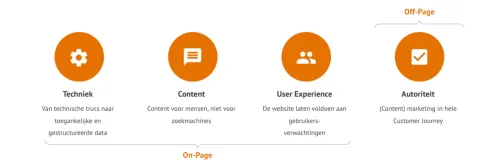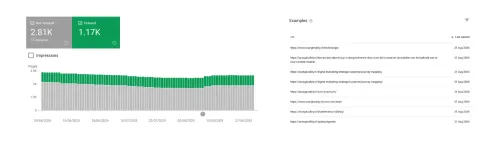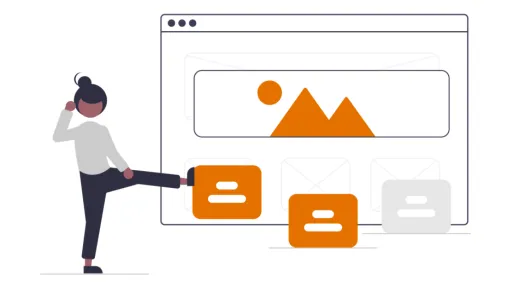In today's digital economy, SEO is the key to the success of your online presence. But how do you ensure that your SEO strategy is effective from the start? The answer lies in a thorough SEO analysis. For companies striving for maximum online visibility and conversion, an SEO analysis is the indispensable first step towards organic findability.
The Essential Components of an SEO Analysis
With an SEO analysis, you evaluate the performance of your website in search engines. Without this fundamental step, any SEO journey would start without clear direction. It is an in-depth assessment of 4 different factors: technology, content, usability, and authority. The goal of an SEO analysis is to identify the strengths and weaknesses of your website and develop a strategy for further optimization based on that.

Why Start with an SEO Analysis?
Starting an SEO journey without first conducting a thorough analysis is like building a house without a foundation. It is essential to lay this foundation to be successful. Here are some reasons why an SEO analysis is indispensable as the first step:
1. Insight into the Current Situation: An SEO analysis provides insight into the current state of your website and what the areas for improvement are. This insight is crucial to understand where you stand so you can develop an effective strategy.
2. Identifying Technical Issues: Technical SEO forms the backbone of your website. An SEO analysis helps you detect these technical issues so they can be resolved before they hinder your further efforts.
3. Strategic Direction: Based on the findings of an SEO analysis, you can develop a targeted data-driven strategy that aligns with the specific needs of your website.
4. Maximum ROI: By focusing on the key areas for improvement, an SEO analysis allows you to spend your investments more effectively
The Four Pillars of a Thorough SEO Analysis
At Follo, we base our SEO analyses on four pillars: Technology, Content, User Experience, and Authority to build a data-driven strategy for your website. These pillars together form a holistic approach that ensures all aspects of your website are optimized.
Technology
A well-optimized website starts with a solid technical foundation. This part of the analysis focuses on the infrastructure of a website and how search engines can crawl and index it. By resolving technical issues, your website can quickly rise in search results. At Follo, SEO technology encompasses various aspects such as:
- Crawling and Indexing: Search engines scan and catalog your website to rank it in search results.
- Robots.txt & XML Sitemap: Robots.txt gives search engines instructions on which parts of your site they may or may not crawl, while an XML sitemap helps search engines find and index all important pages.
- Security: A secure website (HTTPS) protects user data and is often rated higher by search engines.
- URL Structure: A clear and logical URL structure helps both users and search engines understand the content of your pages.
- Heading Structure: Headings (H1, H2, etc.) organize the content of your page, improving readability and helping search engines understand the main topics.
- Canonical Tags: Canonical tags prevent duplicate content by telling search engines which version of a page is preferred.
- Structured Data: Structured Data (schema markup) helps search engines better understand and present specific information on your website in search results.

Content
Content is king in SEO. The quality and relevance of your content determine how well your website scores in search results. It is crucial that your content not only meets the needs of your target audience but is also optimized for the right keywords. Additionally, your content must adhere to Google's E-E-A-T principle (Expertise, Experience, Authoritativeness, Trustworthiness). An SEO analysis helps you see which content performs well and where you can improve to score better. At Follo, we look at the following components for content analysis:
- Page Content: The content of each page must be relevant and of high quality to score well in search results.
- SEO Page Title and Meta Description: The title and description of a page must be attractive and keyword-focused to attract both users and search engines.
- Alt Tags: Alt tags describe images for search engines and improve the findability of visual content.
- Low Content Pages: Pages with little content should be improved or expanded to perform better in search results.
- SERP Features: Optimizing for SERP features, such as People Also Ask boxes, can increase the visibility and click-through rate of your page.
For an in-depth insight into how you can benefit from SERP features, we offer innovative and data-driven solutions at Follo. Our People Also Ask (PAA) analysis and Featured Snippet analysis help you increase the visibility and click-through rate of your pages by optimizing for these valuable SERP features. By applying these advanced analyses, you can more effectively respond to user questions and position your content for prominent visibility in search results.
User Experience
User experience plays a crucial role in SEO. A user-friendly website ensures that visitors stay longer and find the desired information faster, which indirectly improves your SEO results. A positive UX is therefore not only important for SEO but also for retaining visitors. An SEO analysis assesses the usability of your site and offers suggestions for improvement, which can include the following aspects from an SEO perspective:
- Navigation Menu: A well-structured navigation menu helps visitors easily find the desired information, improving their user experience.
- Load Performance/Mobile Friendliness: Fast loading times and a mobile-friendly website provide a better user experience, contributing to higher SEO scores.
Want to further improve the user experience of your website? You can also look at the WCAG 2.1 guidelines. These guidelines are designed to make your website accessible to everyone.
Authority
The authority of your website plays a major role in how search engines rank your site. This is often measured by the number and quality of external links to your site. An SEO analysis assesses your current link profile and helps you understand how to strengthen your site's authority through targeted link building strategies.
- Domain Authority: The overall credibility of your website (according to search engines), based on the quality and quantity of external links, influences your ranking in search engines.
- Page Authority: The authority of individual pages determines how well they score in search results, depending on their link profile.
- Target Page Ratio: The distribution of external links to specific pages can enhance the relevance and authority of those pages.
- Anchor Texts: The texts of links must be relevant and descriptive to help search engines understand the content and rank it well.
- Internal Links: Internal links connect pages on your site and help both users and search engines understand the structure and hierarchy of your content.
From Analysis to Action: A Data-Driven SEO Strategy
After analyzing the current situation and performance of your website, you develop a data-driven SEO strategy. This means making decisions based on concrete data from the analysis, such as which keywords to target, which technical adjustments have priority, and which content needs to be optimized. This approach creates a strategy that not only delivers short-term results but is also focused on long-term growth and adaptation to future changes in search algorithms.

Stay Ahead: The Key SEO Trends of Today
Currently, there are some key SEO trends to watch out for. Search engines are increasingly using AI and machine learning to refine search results, meaning your content must align with user intents to score well. Additionally, Google places more value on E-E-A-T (Experience, Expertise, Authoritativeness, Trustworthiness), especially in sectors like health and finance, emphasizing the need for credible and trustworthy content. Finally, there is the rise of zero-click searches, where users find their answers directly in search results without clicking through to a website.
It is essential to stay informed about these trends and continuously adapt your SEO strategy to remain competitive in the ever-changing digital landscape.
Why an SEO Analysis is the Foundation for Your Online Success
A thorough SEO analysis lays the foundation for any successful optimization strategy. It provides you with insights into the technical state, content quality, usability, and authority of your website, allowing you to implement targeted improvements. By turning these insights into a data-driven SEO strategy, you not only make an impact now but also ensure sustainable growth in the future.
Curious how a tailored SEO analysis can transform your website? Contact us for SEO Quickscan or a free consultation and discover how Follo can help elevate your online success to new heights. Take the first step towards better visibility and higher conversions.




